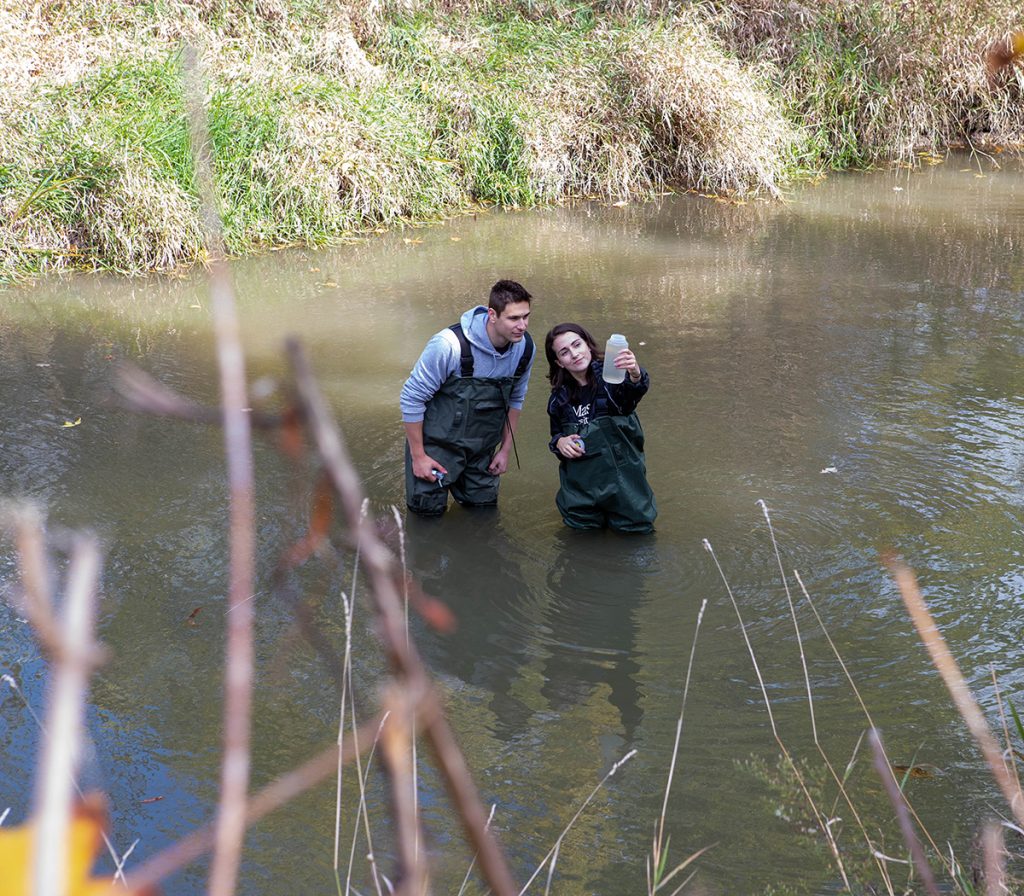Educational water opportunities
Water Without Borders
The Water Without Borders is a graduate program that allows students to learn more about and develop ideas to tackle the issues of water access and resiliency in local, national and international communities
Ohneganos – Indigenous Ecological Knowledge, Training, and Co-creation of Mixed-Method Tools
Following an engagement with key partners, researchers at McMaster University developed a plan – Ohneganos. This project has three main objectives: a) the co-creation of bilingual educational resources to build communities’ capacity to manage future environmental challenges; b) the strengthening of youth mental health resilience in relation to water security, c) the training of youth in water rights and governancestrategies inclusive of Indigenous laws.
Water resource education outreach in the community
These initiatives collectively reflect the university’s role as an active educational body within the local community, especially in promoting the stewardship of water resources.
Celebrating World Water Day, the institution showcases its extensive water research, highlighting cross-disciplinary efforts to foster knowledge and innovation.
The Fishing for Science program is an outreach initiative where McMaster students engage with Hamilton students from grades 7 and 8, encouraging them to explore water science and its remediation through hands-on activities.
Efforts to integrate Indigenous and Western knowledge to improve water security for the Six Nations further illustrate McMaster’s dedication to community education and sustainable water management practices.
Ride for a Greener Tomorrow
Hamilton’s shoreline served as the backdrop for a recent cycling event where community members gathered to discuss the importance of water research and sustainability practices.
The Water Cycles ‘Welcome Back’ ride — the first McMaster cycling event of the fall — was organized by the Academic Sustainability Programs Office in collaboration with Hamilton Bike Share and Water Cycles Expeditions.
The event saw more than 40 students, staff, faculty and community members gather to hear from McMaster water research experts.
Starting from campus, participants pedaled along the scenic Waterfront Trail, eventually arriving at Bayfront Park. Speakers then discussed the importance of water and ongoing research, sharing their perspectives on sustainability practices.
McMaster hosts inaugural Global Water Futures conference
McMaster University hosted the inaugural Global Water Futures (GWF) Annual Science Meeting in May 2022. GWF is aimed at delivering risk management solutions—informed by leading-edge water science — to manage water futures in Canada and other cold regions where global warming is changing landscapes, ecosystems, and the water environment. Ravi Selvaganapathy, McMaster’s Canada Research Chair in Biomicrofluidics, is working on a GWF-funded research project to develop water sensors that can be used in resource-poor areas.
iWetlands water research [also mentioned in above link]
McMaster University belongs to a network of researchers that conducts outreach events to raise awareness about wetland ecosystems, species at risks and citizen science initiatives throughout the Georgian Bay Biosphere Reserve (GBBR) on Eastern Georgian Bay, the world’s largest freshwater archipelago. The team works to increase community knowledge to support the development of restoration, reclamation, and adaptation strategies.
RBC Blue Water Foundation Water Week
Led by internationally recognized McMaster University researchers and post-doctoral fellows in collaboration with community partners, these water projects have introduced community members to hands-on environmental science monitoring, educated the public about the effects of climate change, provided students with valuable learning opportunities, and resulted in the collection of unique local data that influenced water stewardship policies in the Hamilton region and beyond.
McMaster hosts inaugural Global Water Futures conference
McMaster University hosted the inaugural Global Water Futures (GWF) Annual Science Meeting in June 2018. GWF is aimed at delivering risk management solutions—informed by leading-edge water science — to manage water futures in Canada and other cold regions where global warming is changing landscapes, ecosystems, and the water environment. Ravi Selvaganapathy, McMaster’s Canada Research Chair in Biomicrofluidics, is working on a GWF-funded research project to develop water sensors that can be used in resource-poor areas.

